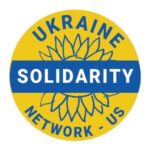Catherine Samary
Posted July 9, 2024
“Travailleuses de la résistance.”
Les classes populaires ukrainiennes face à la guerre
By Daria Saburova, 2024.
Available from the publisher’s website.

DARIA SABUROVA HAS written a fascinating three-month wartime field study of the Ukrainian mining town of Krivih Rih (which happens to be the home town of president Zelensky). It focuses on the voluntary “resistance work” of working-class women in this town. (For now, “Resistance Work” of Women Workers. The Ukrainian working classes in the face of war is in French only.)
This is a “situated” investigation: it breaks with the “geo-political” approaches that dominate a section of the left that ignores Ukrainian society under attack and in resistance. She also rejects certain positive but essentialized presentations of the Ukraine as a resistance movement, obscuring the cleavages and contradictions (class, gender, even ethnicity) that run through it.
Saburova also tells us, after the emotion of several encounters and stories, that she feels “unable to find the words” – except in an indirect way – “to describe the violence of the occupation and the war.” (33) But with impressive richness and “political” sensitivity, in the most complex sense, she introduces us to experiences, perceptions of the past and popular behavior that resist the norms (neoliberal or linguistic) that – dominant forces would like to impose – wherever they come from.
The gendered and class perspective is combined with a contextual approach that rejects stereotypes and linear visions of history. This is a invaluable book that helps us to see the unexpected — and to reflect.
Daria Saburova aims to anchor her study from the point of view of the volunteer workers she interviewed. She reveals the ambivalence between “popular resistance” (to help the men at the front) and “free work” by working-class women.
In this respect, the analysis highlights the transformations produced by the war at the heart of the mechanisms of “social reproduction,” when the invisibility of women’s usually “domestic” tasks in the private sphere becomes “socialization” via self-organized solidarity from below, towards the combatants.
Saburova goes on to analyze so-called “volunteer work,” which incorporates heterogeneity and social hierarchies embedded in a system: the big “humanitarian organizations” capture specific resources and pay their middle-class ”volunteers,” women and men occupying specific positions of responsibility.
This is what the second chapter explores. Here Daria Saburova highlights how, after decades of dismantling the social state, the “laws of the global humanitarian market” (and its large NGOs) are being applied, affecting their rules and sub-contracting, at the end of the chain, in the field, to the free voluntary work of working-class women.
In so doing, the analysis and contradictory concept of “resistance work” sheds light on both the “self-organizing capacities of the working classes” in areas where the social state is deficient — and the aggravation of exploitation that this entails, within gendered social reproduction.
The third chapter sheds historical light on the economic restructuring and political struggles underlying these mechanisms in Ukraine, “from independence to war.” Saburova explains the problematic and periodization proposed by Denys Gorbach,(1) analyzing the tensions between “two models of capitalism” — “paternalistic capitalism” driven by “pro-Russian forces” (predominant in Krivih Rih) and neoliberal capitalism “driven by pro-Western national-liberal elites.”
Saburova’s research and commentary highlight the specific experiences (in the Krivih Rih region) of the major crises and bifurcations in the history of independent Ukraine — from 1991 to the “Maidan revolution;” the tipping point of the Russian annexation of Crimea and the hybrid war in the Donbass from 2014 to 2022, and then the invasion.
Daria Saburova brings to light this present past from which emerge differentiated identities, subverted and revisited by the war.
The book concludes with a discussion of the “new symbolic order” produced by the interaction of profound transformations at various spatial and social scales.
How does the war — and the opposing injunctions of ethnicity and language — transform the behavior and choices of the working classes studied in this overwhelmingly Russian-speaking region? And what does such a label mean — and, according to some approaches, ”is supposed” to mean?
Daria Saburova takes another look at the stereotypes that ethnicize politics. And she once again reveals the ambivalent behavior and choices of the people resisting on several fronts in this region, which was overwhelmingly “anti-Maidan.”
These ambivalences are condensed in the linguistic practice of the Surjyk language (or languages), a mixture of Russian and Ukrainian. How has the Russian invasion affected relations with the language — Russian and Ukrainian?
“The linguistic situation in Ukraine,”writes Daria Saburova, “is today reducible neither to the process of ‘decolonization’ claimed by the Ukrainian elites, nor to the ‘oppression of Russian speakers’ brandished by the Russian ruling class to justify its war of aggression.”
This refusal of simplistic binary presentations is deeply at work throughout the book, and lies at the heart of the concept of the “work of resistance” that Etienne Balibar explores in his preface. In the face of normative discourse, Daria analyses the extent to which the words themselves — such as “voluntary work:” — are ambivalent and subverted by the war, covering different social realities.
The new words associated with the war have led to a shift from “benevolent work” to “volonterstvo,” a more encompassing concept which, as Daria Saburova points out, has become “one of the main ways in which work is mobilised in wartime among all sections of the population.”
But the concept of “resistance work” that Daria invents also allows her — beyond the feminist and class dimensions — to establish a link between humanitarian issues and the political issues associated with war. This is one of the many areas where “the outcome of the war will determine the possibilities for reconfiguring the balance of power” — one of the questions opened up by this moving and fascinating book. It simply must be read.
Note
- Denys Gorbach, The Making and Unmaking of the Ukrainian Working Class: Everyday Politics and Moral Economy in a Post-Soviet City. Berghahn Books.
back to text


Leave a Reply